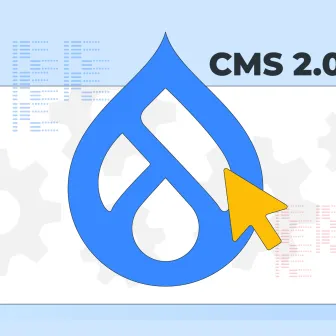The long-awaited Drupal 9 was launched on June 3, 2020. It comes with solutions that empower businesses to take advantage of the power of Drupal. With the thousands of modules that Drupal provides, I will take you through the ones that will help you with the development of the Drupal 9 site.
Here’s a list of the must-have Drupal 9 modules!
Token
The Token module provides tokens that are not supported by core and also provides a UI for browsing tokens.
Admin Toolbar
The Admin Toolbar module allows you to improve the administration menu at the top of your website and transforms it into a dropdown menu, to make it easier to access all the administration pages.
Metatag
Metatag module allows you to provide structured metadata about a website. It provides support for metatags that gives you control over how your content appears when you share it on social networks.
It supports a large number of commonly used meta tags, including the page title, description, canonical URL, etc.
Simple XML Sitemap
The Simple XML Sitemap module is needed by every webpage for SEO reasons. It creates a multilingual sitemap for entities, custom links, and views.
This module allows you to create multiple custom sitemaps through sitemap generator plugins along with customizing the URL generation through URLGenerator plugins. Also, the module gives access to automatic submission to search engines and XSL stylesheets for human visitors.
Pathauto
The Pathauto module allows you to create patterns for your content while creating it. It automatically creates a URL for different kinds of content without the user creating one manually.
Redirect Module
The Redirect module provides interesting functions like allowing you to create redirects manually and maintaining a colonial URL for all kinds of content, that redirects all other requests to that path.
This module provides a common API for loading, deleting, and saving redirects. It also provides case-sensitive redirect matching with a hook to allow the other modules to decrease the candidate redirects.
Paragraphs
The Paragraphs module allows the site builders to make things cleaner so that you are able to give extra editing power to the end-users.
This module has a 'paragraphs' field type that helps to add a new paragraph field on your content and choose which paragraph type should be available to the end-users. You can also add a custom options field and do confidential coding in your CSS.
With the Paragraph module, end users can now choose on-the-fly between predefined paragraph types that are independent of each other.
Twig Tweak
Twig Tweak module provides a twig extension that helps in improving development experience.
Diff
The Diff module adds a tab that shows all revisions like standard Drupal, to permissioned users. The tab also shows all added, deleted, and changed words between revisions.
Shield
The Shield module handles Drupal as a 'walled garden' if a user does not know a user name or password. It also creates a shield for the website with Apache authentication.
If you need to keep unwanted traffic away, shield is the module!
Seckit
The Seckit module allows the modification of certain HTTP headers on your website to enhance the security of your site. You can always increase security in other ways. But the Security module makes it easier and more convenient. It comes with many security hardening options and reduces the risks of exploitation of web application vulnerabilities.
Environment Indicator
With the Environment Indicator module, it becomes easy to work with stage, dev, local, and prod.
If this module is coupled with configuration split and admin toolbar modules, it can display which environment you are working with. It adds a color bar that informs you about the environment you are currently working with.
Configuration Split
The configuration Split module allows outlining of the sets that will be exported to different directories and get merged together when exporting.
403 to 404
403 to 404 module is designed to show a 404 error when someone tries to access a page that they do not have permission to view.
Inline Entity Form
The Inline Entity module provides a widget for inline management like modification, removal and creation. It extends the functionality of entity reference fields in Drupal which makes sure that the entities are edited, created and deleted on the go.
Advanced CSS/JS Aggregation
Advanced CSS/ JS Aggregation module improves the frontend performance of your website. It provides stampede file protection and uses locking so that multiple requests for the same thing results in just one thing doing the work. Check out performance optimization techniques of a Drupal website to know more.
Webform
The Webform module is responsible for making surveys and forms in Drupal. Emails can be sent to administrators after submission is done. This module has an extensive API to be able to expand its features and it also provides a basic statistical review.
Coffee
If you are wondering about navigating through the admin quickly, Coffee is your module! All you need to do is type alt + D to visit start this module and type for the page you'd like to visit.
Queue UI
The Queue UI module allows viewing queues and the number of items, deleting and processing queues during cron, and also removing leases.
Backup and Migrate
The Backup and Migrate module allows you to decide which table and data to backup. With the help of this module, you can dump all of your databases to a file download or save it offsite and also restore it from the previously saved database. Read about how to migrate to Drupal 9 to know more.
Devel
The Devel module allows the execution of PHP code inside the website and also creates dummy content.
Captcha
The challenge-response that we often see while signing up or logging in is the work of the Captcha module. The main purpose of this module is to block sign-ups from spam bots that post spam content anywhere they can.
Chaos Tool Suite (Ctools)
Chaos Tool Suite is primarily a set of APIs and tools that help in improving the experience of the developers. This suite contains a module known as the page manager that manages panel pages, and as it grows, it manages more than just panels.
RESTful web services
The RESTful Web Services module provides a customizable RESTful API of data managed by Drupal. It allows you to interact with different content entities like users, comments, nodes, etc along with watchdog database log entries. Read everything about Decoupled Drupal and its approaches to know more.
JSON:API
The JSON:API module helps in formatting JSON responses. It allows users to customize how their content is arranged on a page and even create landing pages with an easy to use drag and drop interface.
Layout Builder
The Layout Builder module allows content builders to quickly create layouts to display content. You can easily customize your content’s arrangement on a page or across different kinds of content and even create landing pages that have an easy to use drag and drop interface.
Media module
Media module is a replacement of the Drupal core upload field that has a unified user interface wherein administrators and editors can manage their files and multimedia assets.
Media library module
The media library module comes with additional features to find and use existing media items and enhance the media list. This is specifically designed for sites with a lot of content where all the media assets can be reused.
Claro
Claro is a clean and accessible administrative theme. It is a part of the Admin UI and JavaScript modernization initiative.
Conclusion
There is so much more that Drupal modules provide for your website to become an interactive one. All of these modules are actively maintained and compatible with drupal 9. You can use them to build something great. For an interactive and great user experience for your website reach out to us at [email protected]
Subscribe
Related Blogs
What’s New in Drupal CMS 2.0: A Complete Overview

"Drupal CMS 2.0 marks a significant change in the construction of Drupal websites, integrating visual site building, AI…
Drupal AI Ecosystem Part 6: ECA Module & Its Integration with AI

Modern Drupal sites demand automation, consistency, and predictable workflows. With Drupal’s ECA module, these capabilities…
Inside the Drupal AI Summit: Themes, Speaker and What To Expect

“ The web is changing fast, and AI is rewriting the rules. It writes content, builds pages, and answers questions directly,…




